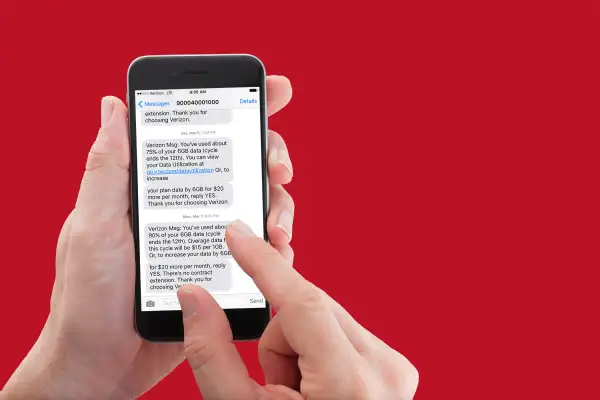Alert! Verizon's Data Alert Email Can Push You Into a $15 Overage Fee

Cell phone customers know that going over your data limit can be costly. With Verizon, exceeding the limit results in a $15 charge, which buys you 500 MB of padding.
To help customers avoid unexpected fees, Verizon and AT&T automatically send email and SMS (text) alerts when you hit certain points in your data usage, typically 50%, 75%, 90%, and 100%.
Helpful as this can be, the system has one enormous flaw: The alert email sent out when you hit 100% of your data usage can push you over your limit and trigger the $15 charge, even if you turn off your data immediately upon notification. (I should know; it recently happened to me.)
According to multiple Verizon customer service representatives, there is little leeway here: just a minuscule 0.001 MB will trigger the overage system and charge you for an extra 500 MB. For perspective, a Verizon notification email is approximately 0.082 MB in size—82 times the amount necessary to tip you over the line. As a result, with email alerts enabled, it seems impossible to actually use 100% of your data without incurring a charge.
"If you've already hit 100% of your data it's very likely you'd go over by at least 1 KB anyway," says Julian Kurland, who runs the bill-lowering service BillFixers with his brother Ben. "But if you have emails pushed to your phone automatically, it does sound like that would ensure that even someone who managed to stop right at the precipice of 100 percent would be certain to be tipped into the $15 fee abyss by the notification."
Although an AT&T spokesperson wouldn't directly answer queries on this issue, AT&T seems to have an almost identical system—although its rollover plan provides some data flexibility, and a customer service representative indicated that the company is usually forgiving if a customer is just over the line and begs forgiveness.
For its part, T-Mobile stopped charging overage fees in 2014—it just slows down your data—and most Sprint customers have unlimited data.
Verizon's official stance on this is a big shruggie. "Customers would not be impacted by taking action when receiving the 75% or 90% alert," said a spokesperson, who declined to address the fact that the company's alert system seems to have been designed to trigger an automatic overage charge if consumers use every bit of the data they pay for.
So is this default notification email an intentional, clever way to get customers to upgrade to a more generous data plan?
"I can't say definitively if Verizon and AT&T are being careful about whether their alerts run the risk of pushing people over their usage," says Ben Kurland, BillFixer's co-founder. "[But] they've definitely incentivized themselves not to be."
Around 20% of Verizon customers and 25% of AT&T customers have faced overage charges, according to a report last October from Cowen & Co. The report also noted that the number of Verizon customers upping their data plans has increased every quarter, thanks to a new system that makes it easy to switch into a larger "bucket" of data that includes an additional 3 GB for $15 (the same amount as the overage fee).
It's impossible to truly know why customers decide to switch to higher plans, and Verizon won't say how many people upgrade after an overage. But it stands to reason that at least some customers are persuaded to upgrade after being dinged for exceeding the cap by a microscopic amount.
Consider what the notification email says when you hit your limit:
"The mobile number above has used its data allowance for this month. You may be able to avoid data overage charges by increasing your data allowance before the 16th and selecting that the change be backdated to the beginning of the current bill cycle."
In other words, Verizon will drop the one-time charge for the 0.001 MB if you agree to pay $15 more per month for a bigger plan. Interestingly, the email doesn't actually say you've exceeded the cap and are going to face a charge, so even if you somehow managed to toe the line precisely, you wouldn't know for sure.
So what are your options as a consumer if you don't want to upgrade your plan?
Neither Verizon nor AT&T has a fully customizable system for alerts—one at 97% of data usage, for example, would effectively serve as a grace window of sorts. Verizon does offer an automatic shutoff option, but it's nestled under an obscure add-on called "Family Base," and costs $4.99 a month as an add-on to your standard plan.
The best solution, weak as it is, is to disable the default setting that dispatches email alerts and rely solely on the SMS notification, since text messages are not factored into data plans. There's no guarantee that will keep you from an overage fee if you're flirting with the limit, but it might just be enough to save you $15.